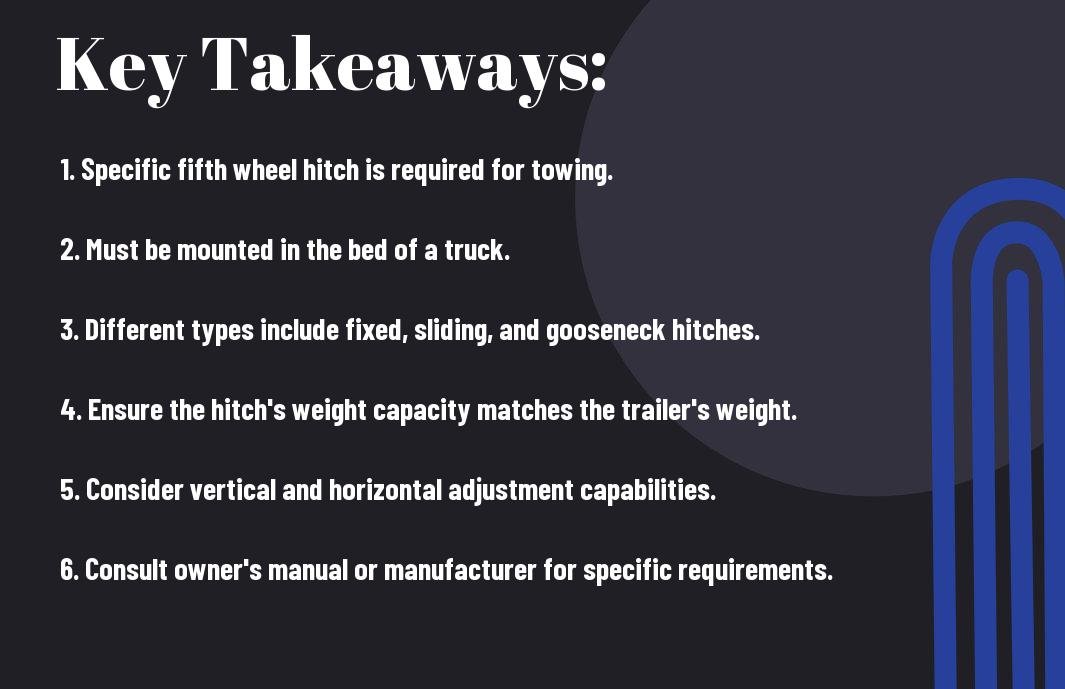So, you’ve decided to invest in a 5th wheel and now you need to consider what kind of hitch is needed to safely tow it. It’s crucial to make the right choice when it comes to your hitch, as it’s a matter of safety and stability. The type of hitch you need will largely depend on the weight of your 5th wheel, so it’s important to know the exact specifications of your trailer. Unlike other types of hitches, a 5th wheel hitch is mounted in the bed of your truck, providing greater maneuverability and a smoother towing experience. It’s imperative to properly install and maintain your hitch to prevent any accidents or issues on the road. By understanding the different types of hitches available, and knowing the specific weight and specs of your 5th wheel, you can ensure a safe and successful towing experience.
Key Takeaways:
- Understanding weight capacity: Make sure to choose a 5th wheel hitch with the appropriate weight capacity for your trailer.
- Hitch compatibility: Ensure that the hitch is compatible with your truck’s bed rail system and mounting hardware.
- Types of 5th wheel hitches: Consider options such as sliding hitches for short bed trucks or fixed hitches for long bed trucks.
- Consider the design: Choose between single jaw hitches or double jaw hitches based on your towing needs and preferences.
- Installation process: Consider the complexity of installing the 5th wheel hitch and whether professional installation is required.
- Budget and quality: Balancing cost and quality is important when selecting a 5th wheel hitch to ensure safety and performance.
- Consult with experts: If you’re unsure about the best hitch for your specific towing setup, seek advice from professionals or experienced tow vehicle owners.

Types of 5th Wheel Hitches
Clearly, when it comes to choosing the right hitch for your 5th wheel, there are several options to consider. It’s important to understand the different types of hitches available in order to make an informed decision. Below is a breakdown of the main types of 5th wheel hitches and their features.
| Type of Hitch | Features |
|---|---|
| Fixed Hitch | Permanent installation, sturdy and stable towing |
| Sliding Hitch | Allows for increased maneuverability, ideal for short bed trucks |
| Gooseneck Adapter | Converts 5th wheel trailer to tow with gooseneck hitch, convenient and versatile |
| Automatic Sliding Hitch | Offers effortless maneuverability and ease of use, great for frequent towing |
| Double Pivot Hitch | Enhanced stability and control, smooth towing experience |
Fixed 5th Wheel Hitches
When it comes to fixed 5th wheel hitches, they are permanently mounted to the truck bed and provide a sturdy and stable towing experience. The main advantage of a fixed hitch is its reliability and strength, making it a popular choice for many 5th wheel owners. However, it’s important to note that a fixed hitch does not offer the same level of maneuverability as some other types of hitches.
Sliding 5th Wheel Hitches
Sliding 5th wheel hitches are designed for increased maneuverability, making them an ideal choice for trucks with short beds. The sliding mechanism allows the hitch to move back and forth, enabling you to make tight turns without the risk of damage to your truck or trailer. This type of hitch provides added flexibility and control, particularly in tight spaces or when navigating around obstacles.
Considerations for Hitch Selection
Your choice of hitch for towing a 5th wheel trailer is a crucial decision that will impact the safety and performance of your towing setup. There are several factors to consider when selecting a hitch, and understanding these considerations will help you make the right choice for your specific needs.
Towing Vehicle Capabilities
When selecting a hitch for your 5th wheel trailer, it is essential to consider the capabilities of your towing vehicle. The hitch must be compatible with the towing capacity of your vehicle, as exceeding this capacity can result in unsafe towing conditions. You should always refer to your vehicle’s owner’s manual to determine its towing capacity and ensure that the hitch you choose is within these limits. Additionally, consider the type of hitch your vehicle is compatible with, as certain hitches are designed for specific types of towing vehicles.
Trailer Weight and Size
Another crucial factor to consider when choosing a hitch for your 5th wheel trailer is the weight and size of the trailer. The hitch you select must be capable of supporting the weight of your trailer, including any additional cargo you plan to carry. It is important to carefully calculate the total weight of the trailer and its contents to ensure that you select a hitch with an appropriate weight rating. Additionally, consider the size and dimensions of your trailer to ensure that the hitch is compatible with its design.
By carefully considering your towing vehicle’s capabilities and the weight and size of your trailer, you can make an informed decision when selecting a hitch for your 5th wheel. It is crucial to prioritize safety and ensure that the hitch you choose is well-suited for your specific towing needs. Choosing the wrong hitch can result in dangerous towing conditions, potentially leading to accidents and damage to your vehicle and trailer. On the other hand, selecting a suitable hitch will provide you with a strong and reliable towing setup, allowing you to tow your 5th wheel trailer with confidence and peace of mind.
Installation and Safety Tips
Unlike traditional trailer hitches, a 5th wheel hitch requires installation within the bed of your truck. It’s crucial to ensure that the hitch is installed correctly to prevent any accidents or damage to your vehicle and trailer.
- When installing your 5th wheel hitch, make sure to carefully follow the manufacturer’s instructions for your specific hitch model. This will ensure that it is installed correctly and securely.
- Inspect your hitch regularly for any signs of wear and tear. If you notice any damage or excessive wear, it’s important to address it immediately to prevent any safety hazards.
- Make sure that your hitch is properly rated for the weight of your trailer. Using a hitch that is underrated for your trailer’s weight can result in dangerous towing conditions.
- Check and double-check all connections and safety features before hitting the road. This includes ensuring that safety pins and locking mechanisms are in place and secure.
After ensuring that your 5th wheel hitch is properly installed and maintained, you can enjoy peace of mind knowing that you are towing your trailer safely and securely.
Professional Installation vs. DIY
When it comes to installing a 5th wheel hitch, you may be wondering whether you should tackle the job yourself or enlist the help of a professional. While some experienced DIYers may feel confident in handling the installation, it’s important to consider the complexity and precision required for proper installation. A professional installation ensures that the hitch is correctly mounted and secured, providing you with peace of mind and safety on the road.
Routine Maintenance and Safety Checks
Ensuring the safety and reliability of your 5th wheel hitch requires routine maintenance and safety checks. Regularly inspect the hitch, including the mounting hardware, for any signs of wear or damage. Additionally, check that all connections, safety features, and moving parts are in good working condition. By performing routine maintenance and safety checks, you can identify and address any potential issues before they become safety hazards.
Conclusion
Hence, when looking to tow a 5th wheel trailer, it is important to ensure you have the correct kind of hitch installed on your vehicle. The most common type of hitch used for 5th wheel trailers is the fifth wheel hitch, which is specifically designed to handle the weight and movement of these large trailers. It is important to consult with a professional to determine the specific weight capacity and requirements for your individual trailer, as well as to ensure that the hitch is properly installed and secured for safe towing. Failure to use the correct type of hitch can result in damage to your vehicle and trailer, as well as posing a safety risk on the road. Trusting in the expertise of professionals when it comes to selecting and installing your hitch is crucial for a smooth and safe towing experience.
FAQ
Q: What kind of hitch is needed for a 5th wheel?
A: A 5th wheel hitch, also known as a gooseneck hitch, is needed for a 5th wheel trailer. It is specifically designed for the weight and towing dynamics of a 5th wheel trailer.
Q: What is the difference between a 5th wheel hitch and other hitches?
A: A 5th wheel hitch is mounted in the bed of a pickup truck and typically has a higher towing capacity than other hitches. It also allows for a tighter turning radius, making it easier to maneuver a 5th wheel trailer.
Q: What should I consider when choosing a 5th wheel hitch?
A: When choosing a 5th wheel hitch, consider the weight of your trailer, the towing capacity of your truck, and the type of hitch mounting system that is compatible with your truck.
Q: Can I install a 5th wheel hitch myself?
A: While some experienced individuals may be able to install a 5th wheel hitch themselves, it is recommended to have it professionally installed to ensure proper alignment and safety.
Q: Are there different types of 5th wheel hitches available?
A: Yes, there are various types of 5th wheel hitches available, including fixed hitches, sliding hitches for short bed trucks, and even automatic sliding hitches. Choose the one that best fits your specific towing needs and truck configuration.
